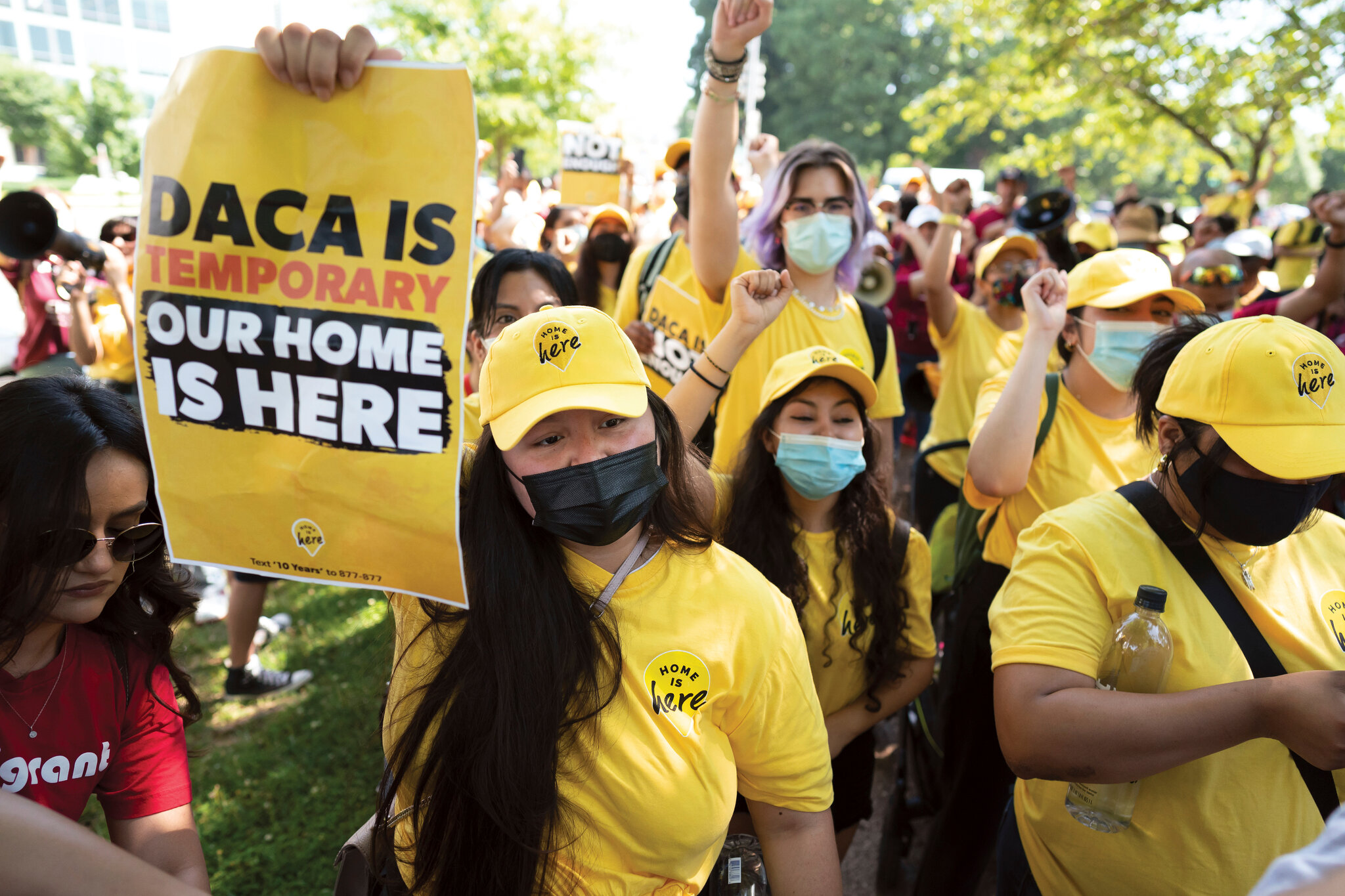Now Reading: DACA News: Understanding the Latest Updates
-
01
DACA News: Understanding the Latest Updates
DACA News: Understanding the Latest Updates

Navigating the world of immigration policy can feel complex, but staying informed is crucial, especially when it comes to programs like Deferred Action for Childhood Arrivals (DACA). This program affects hundreds of thousands of individuals who came to the U.S. as children. The landscape of daca news is constantly shifting, with court rulings and policy changes creating uncertainty for many. This article will break down the latest developments, explain what they mean for recipients, and provide a clear overview of the current state of DACA. We’ll explore recent legal challenges, potential legislative actions, and what the future might hold for Dreamers.
Understanding the latest daca news is essential not just for recipients and their families, but for everyone. The program has significant economic and social impacts on communities across the United States. We will guide you through the key points, ensuring you have a comprehensive grasp of the situation without getting lost in legal jargon.
Key Takeaways
- The DACA program’s future remains uncertain due to ongoing legal challenges in federal courts.
- Current DACA recipients can generally renew their status, but new applications are not being processed.
- Advocacy groups continue to push for a permanent legislative solution from Congress to protect Dreamers.
- Recent court decisions have focused on the legality of the program’s creation, not its merits.
What is DACA? A Quick Refresher
Before diving into the latest daca news, it’s helpful to remember what DACA is and who it helps. Established in 2012, Deferred Action for Childhood Arrivals is an administrative program that provides temporary protection from deportation to eligible young adults who were brought to the United States as children. These individuals are often called “Dreamers.”
To be eligible, applicants had to meet strict criteria, including arriving in the U.S. before age 16 and having lived continuously in the country since June 15, 2007. They also had to be enrolled in school, have a high school diploma or GED, or have been honorably discharged from the military. Critically, DACA does not grant legal status or a pathway to citizenship; it provides a two-year, renewable grant of deferred action and eligibility for a work permit. This has allowed hundreds of thousands of people to work legally, pursue higher education, and contribute more fully to the economy.
The Current Legal Status of DACA
The most significant daca news in recent years revolves around its precarious legal standing. The program has been the subject of numerous lawsuits, creating a rollercoaster of court decisions that impact the lives of recipients.
The 2021 Texas Ruling
A major turning point came in July 2021, when a federal judge in Texas ruled that DACA was unlawful. The judge argued that the Obama administration overstepped its authority by creating the program without undergoing the formal notice-and-comment rulemaking process required by the Administrative Procedure Act (APA). While the ruling was a significant blow, it did not immediately terminate the program for existing recipients. The judge allowed current DACA holders to continue renewing their protections. However, he blocked the government from approving any new applications. This decision effectively froze the program, preventing a new generation of eligible young people from applying.
The Fifth Circuit Court of Appeals Decision
The case was appealed, and in October 2022, the U.S. Court of Appeals for the Fifth Circuit upheld the lower court’s decision, agreeing that DACA’s creation was illegal. The appeals court sent the case back to the Texas judge to review a new version of the DACA rule issued by the Biden administration in 2022. This new rule was an attempt to fortify the program by going through the formal rulemaking process that the courts had said was missing. However, this has not yet resolved the fundamental legal questions.
Impact on Current and Prospective Applicants
The ongoing legal battles have created two very different realities for DACA recipients and those who wish to apply. Understanding this distinction is key to following the daca news.
For Current DACA Recipients
If you currently have DACA, the good news is that you can still apply for renewal. U.S. Citizenship and Immigration Services (USCIS) continues to process renewal applications for those who are eligible. This allows current recipients to maintain their protection from deportation and their work authorization.
However, the uncertainty can be stressful. Advocacy groups recommend that current recipients submit their renewal applications well in advance of their expiration date, typically between 120 and 150 days before. This helps avoid any potential lapse in status while the application is being processed. It’s a temporary solution, but for now, it is the only one available.
For First-Time Applicants
The situation for first-time applicants is much more difficult. Due to the court orders, USCIS is prohibited from approving any new DACA applications. While the agency can still accept initial applications, it cannot process them. This has left tens of thousands of eligible young people in a state of limbo. They meet all the requirements for the program but are blocked from receiving its protections simply because of the timing of the court rulings. The latest daca news offers little hope for these individuals until the legal challenges are fully resolved or Congress acts.
The Biden Administration’s Efforts and the New DACA Rule
The Biden administration has taken steps to defend the DACA program. One of its most significant actions was to issue a new DACA rule in August 2022, which went into effect on October 31, 2022. This rule was designed to address the legal criticisms by codifying the program through the formal APA rulemaking process.
The new rule largely maintains the original DACA eligibility criteria. It reaffirms the administration’s stance that the program is a lawful exercise of executive discretion. The hope was that by solidifying the program’s legal foundation, it could withstand the ongoing court challenges. However, the Texas judge is now reviewing this new rule. Experts following the daca news anticipate that the judge may find this new rule to be unlawful as well, likely leading to further appeals and prolonging the legal battle, which could ultimately end up at the Supreme Court again.
Legislative Outlook: The Push for a Permanent Solution
Advocates, business leaders, and politicians on both sides of the aisle agree that the only way to provide lasting stability for Dreamers is through federal legislation. The constant cycle of daca news about court cases highlights the vulnerability of a program based on executive action.
What Would a Legislative Solution Look Like?
Several bills have been introduced in Congress over the years to provide a pathway to citizenship for Dreamers. The most prominent of these is the DREAM Act (Development, Relief, and Education for Alien Minors Act), which has been introduced in various forms for over two decades. Other proposals, like the American Dream and Promise Act, have also been passed by the House of Representatives but have stalled in the Senate.
These bills typically propose granting conditional permanent resident status to DACA recipients and other eligible Dreamers. After meeting further requirements, such as pursuing higher education, working for a certain number of years, or serving in the military, they could then apply for lawful permanent residency (a green card) and, eventually, U.S. citizenship.
Challenges in Congress
Despite bipartisan public support for protecting Dreamers, passing immigration legislation has proven incredibly difficult. The political climate is highly polarized, and immigration reform is often tied to broader, more contentious debates about border security. For a bill to pass the Senate, it would need 60 votes to overcome a potential filibuster, requiring significant bipartisan compromise. As of now, that level of agreement has not been reached, leaving Dreamers’ futures dependent on the courts. As some policy experts at https://forbesplanet.co.uk/ note, comprehensive reform often requires major political will that can be hard to muster in a divided government.
The Economic and Social Impact of DACA
The ongoing stream of daca news is not just about policy; it’s about people and their contributions to the country. DACA recipients are deeply integrated into the American economy and society.
- Workforce Participation: A vast majority of DACA recipients are employed, working in critical sectors like healthcare, education, and technology. They are nurses, teachers, engineers, and small business owners.
- Tax Contributions: Dreamers pay billions of dollars in federal, state, and local taxes each year. Terminating the program would result in a significant loss of tax revenue.
- Economic Growth: As consumers and entrepreneurs, DACA recipients contribute to economic growth. They buy homes, start businesses, and create jobs for other Americans.
The table below summarizes some key statistics about the economic contributions of DACA recipients.
|
Economic Contribution |
Estimated Annual Impact |
|---|---|
|
Federal, State & Local Taxes Paid |
Over $9 billion |
|
Spending Power |
Over $25 billion |
|
Homeownership Rate (DACA-eligible) |
Approx. 15% |
|
Entrepreneurship Rate |
Higher than the general population |
Note: Figures are estimates based on various studies and can fluctuate.
Ending DACA would not only disrupt the lives of its recipients but would also have a negative ripple effect on the U.S. economy. Many businesses would lose valuable employees, and communities would lose neighbors, friends, and family members.
How to Stay Informed About DACA News
With the situation changing so frequently, it’s important to rely on credible sources for daca news. Here are some reliable places to find information:
- U.S. Citizenship and Immigration Services (USCIS): The official USCIS website has a dedicated page for DACA, providing the most accurate information on renewal processes.
- Immigrant Advocacy Organizations: Groups like United We Dream, the National Immigration Law Center (NILC), and FWD.us provide up-to-date legal analysis, resources, and news.
- Reputable News Outlets: Major news organizations with dedicated immigration reporters offer in-depth coverage of court cases and legislative efforts.
Be cautious of misinformation, especially on social media. Always verify information with an official source or a qualified immigration attorney before making any decisions related to your DACA status.
Conclusion
The future of DACA remains in the hands of the federal courts and Congress. The latest daca news underscores a period of profound uncertainty, where current recipients can renew their status but a new generation of Dreamers is locked out. While the Biden administration has attempted to fortify the program, its legal foundation remains shaky.
The most widely supported long-term solution is legislative action from Congress to create a pathway to citizenship. This would provide the stability that Dreamers, their families, and their communities need. Until then, hundreds of thousands of young people who have grown up in America will continue to live with the anxiety of a temporary status, hoping for a permanent resolution that recognizes them as the Americans they already are in every sense but on paper. Staying informed and supporting calls for a legislative fix are the most impactful actions that concerned individuals can take.
Frequently Asked Questions (FAQ)
Q1: Can I still apply for DACA for the first time?
No. Due to federal court orders, USCIS is prohibited from approving initial (first-time) DACA applications. While they may accept the application, they cannot process it.
Q2: Is it safe to renew my DACA right now?
Yes. The court rulings have allowed for the continued processing of renewal applications for those who already have DACA. It is highly recommended that you submit your renewal application 120-150 days before your current DACA expires.
Q3: Does DACA provide a path to citizenship?
No. DACA is a temporary program that provides deferred action from deportation and work authorization. It does not grant lawful immigration status or a direct path to a green card or U.S. citizenship.
Q4: What happens if the courts end DACA completely?
If the courts were to end the program entirely, it is likely there would be a wind-down period. During this time, existing work permits would likely remain valid until their expiration date, but no new renewals would be issued. This would create an urgent crisis, intensifying calls for Congress to act immediately.
Q5: How can I support DACA recipients?
You can support DACA recipients by staying informed with factual daca news, contacting your elected officials in Congress to voice support for a permanent legislative solution like the DREAM Act, and supporting immigrant rights organizations that provide legal and advocacy services.




















